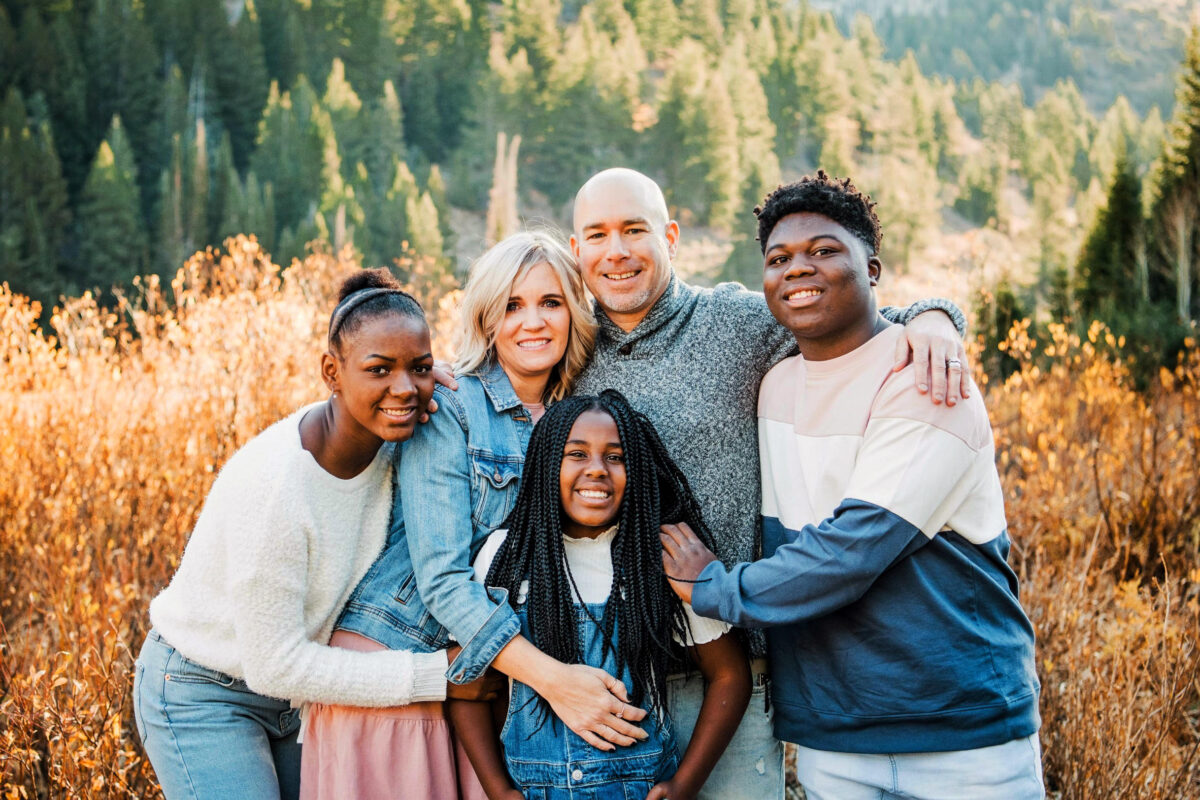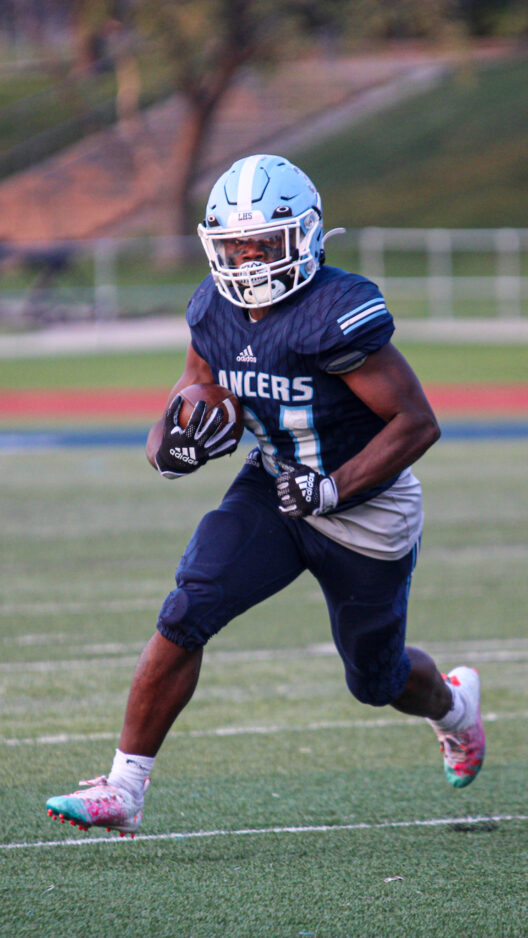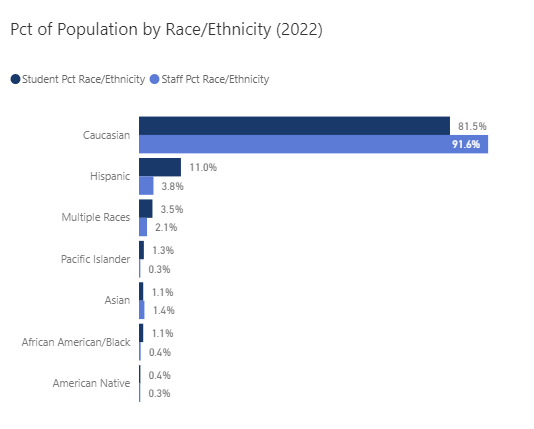Justice Department slams Davis School District for ‘pervasive’ racial harassment, discrimination
- Members of the Utah Black Roundtable attend a Davis School Board meeting on Tuesday, June 4, 2019, at in Davis School District in Farmington.
- In this family portrait, Lissa West and her husband pose with their three adopted children. Elias West, 17, a Layton High School football player, has undergone racial harassment in the Davis School District, Lissa West said.
- Layton High School running back Elias West.
- Davis School District staff and students racial breakdown.
- Davis School District population, by race.

SAMANTHA MADAR, Standard-Examiner file photo
Members of the Utah Black Roundtable attend a Davis School Board meeting on Tuesday, June 4, 2019, at in Davis School District in Farmington.
FARMINGTON — A two-year Justice Department investigation found “serious and widespread racial harassment” of Black and Asian-American students in the Davis School District. In a settlement agreement with the district, the federal agency ordered a sweeping program to correct the problems.
The department’s Civil Rights Division announced the findings in Washington, D.C., on Thursday, citing persistent failures to respond to reports of race-based harassment by district staff and other students. The investigation began in 2019 and covered the period of 2015-2020.
Investigators, according to the report, found “hundreds of documented uses of the N-word, among other racial epithets, derogatory racial comments, and physical assaults targeting district students at dozens of schools.” The Justice Department concluded that, for years, Davis’ “ineffective response left students vulnerable to continued harassment and that students believed the district condoned the behavior.”
The department said it found “severe, pervasive, and objectively offensive race-based harassment in schools across the district. Parents and students informed DOJ that white students repeatedly called Black students the n-word despite the district’s knowledge and without consequence.”
Lissa West said Friday that news of the Justice Department investigation underscored her 17-year-old son’s experiences in the district. Elias West, a Layton High School running back, was called the N-word by a Syracuse High School tackler in an Oct. 4 game, she claims. Elias retorted, “Don’t f—— call me a n—–,” she said. Her son was suspended for two games and the white player was not disciplined because the referees did not hear what he said or know which player said it.

Photo supplied, Lissa West
In this family portrait, Lissa West and her husband pose with their three adopted children. Elias West, 17, a Layton High School football player, has undergone racial harassment in the Davis School District, Lissa West said.
The federal report “just kind of solidifies what we’ve already learned about the Davis School District,” Lissa West said.
In the report’s findings, the Justice Department said, “We learned of incidents in which white students referred to Black students as dirty, asked why they did not wash their skin, and commented that their skin looked like feces,” the report said. “White students also called Asian-American students pejorative slurs, such as ‘yellow’ and ‘squinty’ and told them to ‘Go back to China.'”
The district disciplined Black students more harshly than their white peers for similar behavior and denied Black students the ability to form student groups while supporting similar requests by other students, the report said. Black and Asian-American students make up about 1% each of the district’s student population, according to the Utah State Office of Education.
In a letter to Davis officials, the department said the district “has not presented a legitimate explanation for why Black and white students were treated differently under the district’s discipline policy and in law enforcement referrals. In fact, during our interviews, district officials admitted to DOJ that the district’s discipline data revealed that staff treated students of color, and in particular Black and Native American students, differently than white students.”
The investigation began about one month after the Utah Black Roundtable staged a protest June 4, 2019, at a Davis school board meeting, The group was upset by the district’s handling of students’ and parents’ reports of racist behavior by staff and students, according to previous coverage.

Photo supplied, Lissa West
Layton High School running back Elias West.
Several controversies involving racially related incidents have generated news coverage in recent years, including:
- A Black student was suspended from Layton High School and banned from a prom in 2018 after he fought a white student who allegedly called him a racial epithet. The other student attended Clearfield High School. His punishment, if any, was not available to the public, district officials said, citing privacy laws.
- The district paid a $62,500 lawsuit settlement to a Black student and his mother after a West Point Junior High bus driver drove off while the boy was hanging from the bus door. The suit alleged the district was doing nothing to curb the alleged racial animus, bullying and harassment by the bus driver toward the boy and other minority students. The district said the driver was put on leave and later resigned and that the district conducted training for all bus drivers about implicit biases.
The Justice Department settlement requires the district to hire consultants to assess harassment policies, create training regimens to help staff spot and investigate racial harassment or other discrimination, and monitor and report back on the district’s progress.
The district also must create an Office of Equal Opportunity, hire a full-time director and three coordinators for it, and appoint staff OEO coordinators at each school for at least two years.
Further, the district was told to create a centralized electronic reporting and case management system for discrimination reports and start a “culture, climate and community engagement” program.
The district issued a prepared statement saying it was “made aware of serious incidents of racial harassment and discrimination and instances where those incidents were not handled appropriately.”

Graph supplied, Davis School District
Davis School District staff and students racial breakdown.
“The district takes these findings very seriously,” the statement said. “They do not reflect the values of this community and the expectations of the district. The district pledges to correct these practices.” The statement also said, “The district takes seriously its duty to promptly and appropriately investigate and resolve any complaints of discrimination, including harassment on the basis of race.”
Efforts to contact Reid Newey, district superintendent, were not immediately successful. The district’s director of operations, Chris Williams, referred initial inquiries to the prepared statement.
The Utah State Office of Education had no role in the investigation other than cooperating with the Office of Civil Rights, USOE spokesman Mark Peterson said.
HISTORY OF DISCRIMINATION
West said she was dissatisfied with the district’s and the Utah High School Activities Association’s handling of the incident involving her son.
Elias, a senior team captain, got tackled and a Syracuse player said, “Stay down, n—–,” according to Lissa West. “I’m not denying what my son said, but he was provoked,” she said. “That’s not language he normally uses.”

Image supplied, Utah State Office of Education
Davis School District population, by race.
Williams, the district operations director, said incidents at football games are under the purview of the UHSAA. “The referee decided to eject and UHSAA is the disciplinary agency in that decision,” Williams said.
UHSAA assistant director Jon Oglesby said the association has a strict policy that players using discriminatory speech are ejected and suspended, regardless of the context. “We are trying as an association to eliminate the use of racist, homophobic slurs and hate speech,” he said.
Sources familiar with the situation told the Standard-Examiner an investigation took place between Syracuse and Layton High’s football teams, coaches and administrators. The investigation didn’t turn up any proof that a Syracuse player used the n-word, according to the sources, who weren’t authorized to speak publicly about the situation.
In August, there was a meeting held over Zoom between the UHSAA, football coaches, athletic directors and school administrators across the state to address racist incidents that happened in football games just this season. Coaches were told in that meeting to go back to their teams to emphasize that racist language and hate speech wouldn’t be tolerated.
Multiple football coaches confirmed to the Standard-Examiner that they went back to their teams to discuss what was talked about in the UHSAA meeting.
West said her son’s two-game suspension was cut to one game, which he was serving in Friday’s game. “I feel like they should have done some sort of punishment for the Syracuse team,” West said. “They said, ‘We believe your son,’ and yet the only thing they said was that Syracuse might get some sensitivity training.”
West said she and her husband are white and are Elias’ adoptive parents. Elias and his two sisters are Black. “There is a history of people discriminating against him blatantly for his skin color.”
Standard-Examiner reporter Patrick Carr contributed to this story.








